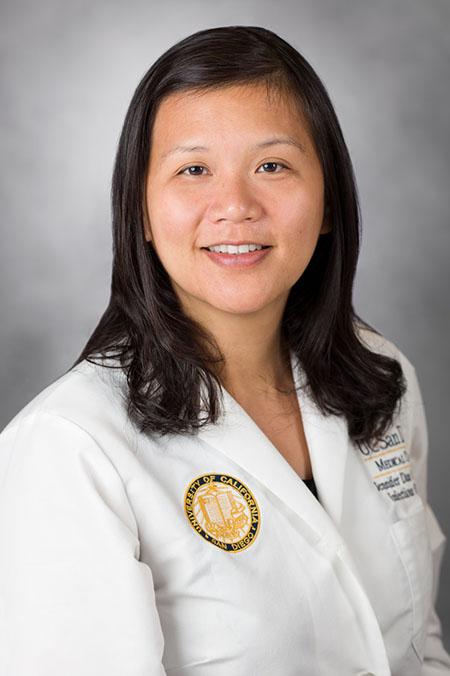A pair of clinical trials at UC San Diego Health and Altman Clinical and Translational Research Institute seek to quantify vaccine benefit to immunocompromised patients — and perhaps help improve it

Credit: UC San Diego Health Sciences
Evidence continues to mount that vaccination against COVID-19, most notably the Pfizer and Moderna vaccines, produces robust, durable protection in the vast majority of recipients.
But questions remain for some at greatest risk of a severe outcome from a COVID-19 infection: Recipients of donor organs and bone marrow whose immune systems are necessarily suppressed to ensure their transplants are successful and lasting.
Some studies have found that vaccinated transplant recipients produce a weak immune response, and severe cases of COVID-19 have been reported in transplant recipients who had received two doses of vaccine.
Researchers at UC San Diego Health have launched a pair of clinical trials to study vaccinated transplant recipients of bone marrow (to treat and cure multiple diseases and types of cancer) and solid organs, such as the heart, lung, liver and kidney.
“Our goal is to quantify the immunogenicity (immune response) of COVID vaccines in immunocompromised populations,” said Jennifer Dan, MD, PhD, an infectious disease specialist at UC San Diego Health. “We want to gain an understanding of how differing degrees of immunosuppression may impact the COVID vaccine immune response and use that knowledge to optimize vaccine regimens for these patients.”
Under current guidelines, both solid organ and bone marrow transplant (BMT) recipients are eligible for COVID-19 vaccination. BMT recipients can begin receiving COVID-19 vaccinations three months after transplant, provided the transplanted cells have engrafted or begun growing within bone marrow. Solid organ recipients can be vaccinated as early as one month after transplantation, although a strong immunosuppression drug regimen to prevent organ rejection may cause a few months’ delay.
In both cases, the patients’ transplant physicians determine when the vaccination process can begin.
Both clinical trials are currently enrolling participants whose transplant procedures can be relatively recent or years in the past. Dan said she expects more recent transplant recipients will likely to produce a less strong immune response from vaccination.
“For instance, if a BMT recipient is four months post-transplantation, that person may not produce as good of an immune response as someone who is two years post-transplantation. This has to do with the pace of how the immune system is reconstituted following transplantation. For solid organ transplant recipients, the amount of immunosuppression will likely dictate if a person makes a good response to the COVID vaccine.”
Dan hopes to enroll 200 solid organ transplant recipients and 200 BMT recipients.
The trials involve a sequence of blood draws. “Ideally, we want to get a pre-vaccination blood specimen,” said Dan. “However, we have been enrolling patients who have already started the vaccination series. We obtain a second blood sample two weeks after the second vaccine dose or six weeks after a one-dose vaccination. Then we draw blood again six months after vaccination to assess the duration of the immune response.”
Immune response is measured by the presence and quantity of neutralizing antibodies and T-cells, both key players in the immune system’s response to foreign bodies, such as viruses and bacteria.
###
The trials are primarily enrolling UC San Diego Health patients, but any qualifying person can participate through the UC San Diego Altman Clinical and Translational Research Institute where testing will be conducted.
For more information about the trials or to enroll, contact clinical research coordinators Yasmeen Esshaki at 858-822-2908 or email [email protected]”>[email protected], or Marielys Padilla-Martinez at 858-534-4449 or email [email protected]”>[email protected].
Media Contact
Scott LaFee
[email protected]




